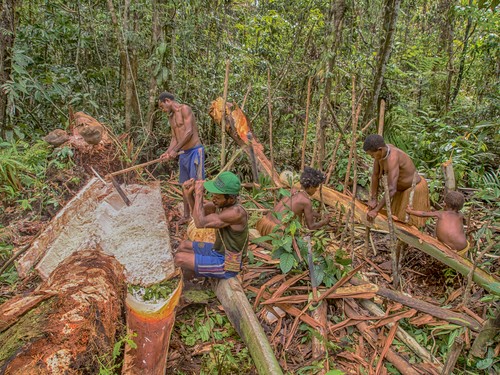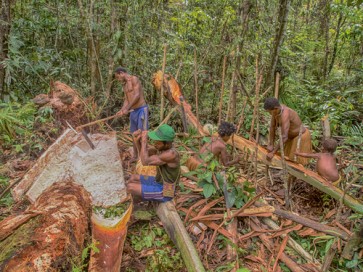Popular Reads
Top Results
Can't find what you're looking for?
View all search resultsPopular Reads
Top Results
Can't find what you're looking for?
View all search resultsDenial of indigenous peoples’ rights fuels land tenure conflict
The struggle against corporate concessions becomes pertinent, as the indigenous communities are disadvantaged, and their identities are at risk of extinction.
Change text size
Gift Premium Articles
to Anyone
T
he Awyu indigenous community in Boven Digoel regency, South Papua has recently captured the attention of social media with the viral tagline #AllEyesOnPapua, which serves as a symbol of solidarity with the Papuan tribe’s resistance to forest resource exploitation by oil palm plantation company PT Indo Asiana Lestari. The Awyu community is also engaged in a struggle against land clearing for oil palm plantations by PT Kartika Cipta Pratama and PT Magakarya Jaya Raya.
Approximately 36,094 hectares of forest have been cleared by PT Indo Asiana Lestari for oil palm plantation concessions. The deforestation in the regency could exceed this figure when including the concession lands of other palm oil companies. In 2023, Pustaka Bentala Rakyat reported that about 51,000 ha of forest in Boven Digoel had been logged for the timber trade and oil palm land clearance.
The large-scale deforestation has threatened the sustainability of the forest's biodiversity and the animals inhabiting the area. This situation has also deprived the indigenous communities of their ancestral forest assets, which they have relied on for hunting and harvesting sago for their daily needs.
For the indigenous people, the forest represents a wealth that guarantees their survival and cultural continuity. At this point, the struggle against corporate concessions becomes pertinent, as the indigenous communities are disadvantaged, and their identities are at risk of extinction.
The tenure conflict involving the Awyu community in Boven Digoel is not solely due to the presence of forest concession holders and palm oil plantation companies. Rather, it originates from the government’s desire to enhance the “surplus value” of land and forests labeled as unproductive. This desire was subsequently formalized in a policy that facilitated access to the proposed surplus value.
Consequently, the Forestry Ministerial Decree No. 782/2012 on the forest area map of Papua province was issued, designating all forest areas in Boven Digoel as state forest. The types of forests are categorized as permanent production forest areas, convertible production forest areas, limited production forest areas, plantation allocation areas, agricultural land allocation areas and protected forest areas.
Unfortunately, in Boven Digoel, no forest areas have been designated as adat (ancestral) forests. Additionally, the forest area map has been upheld through Provincial Regulation No. 23/2013 on the spatial planning for Papua province for the 2013-2033 period. South Papua province was formed in 2022, having been separated from Papua.



















